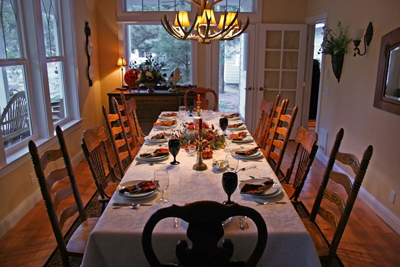Sustain: to give support or relief to; to supply with sustenance, nourish; to keep up, prolong
A few weeks ago, I started thinking about writing a post on how to make Thanksgiving more sustainable — buying a locally-raised turkey and organic potatoes, reusing aluminum foil or perhaps donating some extra canned goods to a food bank or soup kitchen.
Sure all those are great ideas. But I didn’t want to sound snobby or preachy. So, I started pondering what the word “sustainable” really means and wondering about other, more personal, ways of having enjoyable and sustainable holidays beyond just buying (or not buying) specific things.
I think most of us can recall happy occasions involving meals with our parents or grandparents. At least, it’s my hope that family dinners and traditions like Dad carving the bird and Aunt Agnes’ Jell-O salad haven’t been completely abandoned. We remember the fine details of special dinners like the delicately crocheted table cloth, the pattern of the china, the fancy linens. It’s these traditions – food that is carefully prepared, a table lovingly set, recipes made year after year – that we remember long after meals are over and gifts are exchanged.
Recently, a good friend of mine decided that this year she will cook Thanksgiving dinner for a large group (both her and her boyfriend’s families) for the first time. Cooking a turkey, mashing pounds of potatoes and timing everything perfectly can seem a daunting task for those of us who scramble home from work praying there’s still a smear of peanut butter in the jar and the bread’s not moldy.
In order to be completely successful and eliminate the potential for any surprises (turkey explodes, ruins oven) she wanted to do a practice run of the entire dinner, complete with all the side dishes, and invite non-judgmental friends over to be the guinea pigs. I should explain that my friend is a researcher by trade who needs empirical evidence and supporting data for personal as well as professional projects. Our circle of friends, which includes a lot of journalists, need free food. It’s a win-win. Also, being diehard Pittsburgh Penguins fans, we couldn’t help ourselves and began referring to the practice dinner as the “Letestube Turkey,” an homage to the team’s new center, Mark Letestu. (We’re nerds. Creative, but nerds none the less.)
When we arrived at our friend’s place for the practice dinner, we found a beautifully decorated table with candles, linens and real china. The smell of the turkey, brined with apple and spices, along with stuffing, mashed potatoes and seasonal Brussels sprouts, filled the home. A great start for Letestube.
As it turns out, the table where we sat once belonged to a relative and the linens were handed down. As I looked around, I recalled the tablecloth my own grandmother (and now mother) uses for holiday dinners and my family gathered around the table telling stories and laughing. I started thinking that making holidays sustainable is about more than just buying organic potatoes or using seasonal vegetables. It’s about carrying on family traditions and creating your own new ones.
Although the word has recently been applied to everything from farming to building, sustainability, in the traditional sense, means to keep up or prolong something that’s worthwhile. In making a wonderful dinner, my friend not only nourished new relationships and traditions (we hope she needs to practice again next year!) but also carried on the memories first nurtured in her own family. Score one for Letestube!
So, if you find yourself making your own “Letestube Turkey” for the first time this year or for the 30th, remember that it’s shared experiences, memories and laughter that sustain us rather than expensive gifts.
Now, about all that plastic wrap you’re using for leftovers…
